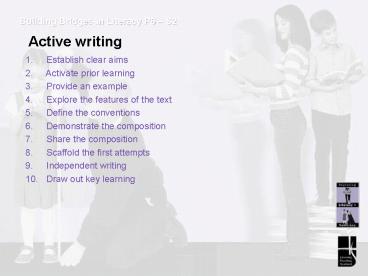Building Bridges in Literacy P6 S2 - PowerPoint PPT Presentation
1 / 14
Title:
Building Bridges in Literacy P6 S2
Description:
Building Bridges in Literacy P6 S2. Establish clear aims. Activate prior learning ... DARTs. Compare two examples of same text type to encourage hypothesising ... – PowerPoint PPT presentation
Number of Views:58
Avg rating:3.0/5.0
Title: Building Bridges in Literacy P6 S2
1
Building Bridges in Literacy P6 S2
Active writing
- Establish clear aims
- Activate prior learning
- Provide an example
- Explore the features of the text
- Define the conventions
- Demonstrate the composition
- Share the composition
- Scaffold the first attempts
- Independent writing
- Draw out key learning
2
Building Bridges in Literacy P6 S2
Model for active writing Shared
criteria Questioning wait-time
3
Building Bridges in Literacy P6 S2
Active writing
- Establish clear aims
- For the unit of work
- For each lesson
- Draw on 5-14 assessment criteria
- Draw on knowledge of features of text-types
Literacy x curriculum training folder - Training implications for staff
- Begin with the end in mind
4
Building Bridges in Literacy P6 S2
Active writing
- Activate prior learning
- Questions
- Mind maps
- Snowballing
- KWL grids What do I Know? What do I Want to
Know? What have I Learned? - Pupil annotation of exemplar texts
5
Building Bridges in Literacy P6 S2
Active writing
- Provide examples
- Consult with librarian
- Use past pupil scripts
- Generate own exemplars if need be
- Use in enlarged formats Big Books, OHT, smart
board - Provide individual copies enlarged or wide
margins for later annotation
6
Building Bridges in Literacy P6 S2
Active writing
- Explore the features of the text
- Planned questioning direct teaching
- DARTs
- Compare two examples of same text type to
encourage hypothesising - Literacy across the curriculum training folder
non-fiction writing module - Share approaches with librarian
7
Building Bridges in Literacy P6 S2
Active writing
- Define the conventions
- Teacher-led
- Draw on outcomes of pupils investigations
- Collate check list
- Label exemplar text
- Make conventions visible for all
8
Building Bridges in Literacy P6 S2
Active writing
- Demonstrate the composition
- Teacher writing solo
- Draw on a ready-prepared text to ensure quality
- Incorporate think-alouds planned in advance
- Refer to check list (No 5)
- Demonstrate importance of re-reading reading
as a writer, writing as a reader
9
Building Bridges in Literacy P6 S2
Active writing
- Share the composition
- Pupils contribute to the process
- Use individual whiteboards to draft suggestions
- Work orally too
- Take more than one suggestion each time
- Discuss reasons for choices
10
Building Bridges in Literacy P6 S2
Active writing
- Scaffold first attempts
- Sentence starters
- Word and phrase lists
- Connectives
- Writing frames
- Prompts and questions
- Pupils devise own scaffolds
- Differentiated and ultimately redundant
11
Building Bridges in Literacy P6 S2
Active writing
- Independent writing
- May be part or whole text
- Reference to aims of task and conventions of text
type - Aware of marking focus
- Peer and self assessment
- Teacher intervention with groups to offer
feedback guided writing sessions
12
Building Bridges in Literacy P6 S2
Active writing
- Reflection and review
- At end of each lesson and at end of full task
- Reference to aims, conventions, process
- Identification of next steps
- Interactive wherever possible
- Foundation subjects training file - plenaries
13
Building Bridges in Literacy P6 S2
Making it happen (Home Groups)
- In the light of the specific focus for your
project, identify key assessment for learning
strategies that can underpin your work - After further reflection on this mornings
sharing of ideas, finalise your key strategies
for learning and teaching in literacy - Try to clarify your expectations regarding the
use of the strategies in 1 and 2 How will they
look in the classroom/library? Are you each
interpreting them in the same way? - Plan how and when you will introduce them, what
additional support you might need, how you will
work together on them, reflect on and review
them, etc
14
Building Bridges in Literacy P6 S2
Extension activity (Home Groups)
- Plan for the development of your critical
friendships - discuss, visit, shadow, team teach, observe . . .
- Refer to the Teachers Journal in your delegate
pack and Spotlight 16 for ideas to consider - Try writing some key focus task plans (unit or
lesson plans) to incorporate the strategies
agreed by the team

